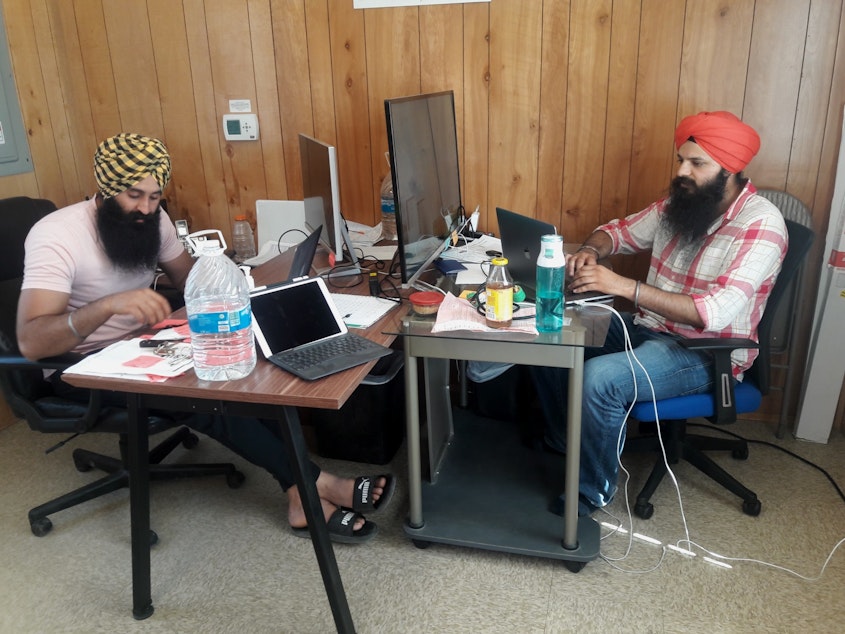Light rail could make or break this immigrant's American dream

Gurpreet Marok's family has owned a modest motel, The New Best Inn, in Kent since 1999. It's a two-story building just off Kent Des Moines road, with a neon sign and Spanish roof tiling. The business is a part of the Marok's immigration and family story: It's the first building the family bought; Marok's uncle died in it in 2004.
Marok’s father had a dream – to knock down this motel and build a much bigger, nicer hotel here.
Sound Transit, with the tremendous energy it has brought to this neighborhood, has made that vision possible for Marok’s family. And Sound Transit has the power to take it away.
Gurpreet Marok's parents immigrated to the United States from Punjab more than 20 years ago. Now the younger Marok wants to continue to fulfill his family's ambitions in the United States.
The new Kent/Des Moines light rail station’s being built just a block away. The trains will run right past the Marok’s family property, which sits just two rail stations south of Sea-Tac airport.
The Marok’s property is also on a list of properties Sound Transit might buy, either in part or in full. He doesn't yet know how much Sound Transit intends to buy, but he's already anticipating the opportunity it could bring—and the risk posed by rising land costs.
“That’s been my family dream, that’s the American dream,” said Marok. To take risks and make things happen. “That’s why we came here.”
In 2015, Marok created a new business, buying another property next to the New Best Inn. He and a friend built a a trucking company that Marok says has had, in just three years, major success.
But Marok has not forgotten his father’s dream of building a modern hotel on those properties. He has a clear vision of it in his mind: “Everything would be modern,” he said, with clean lines and LED lights and enough floors to take advantage of a breathtaking view of Mount Rainier from a party room on the top floor.
In dreaming bigger, Marok is part of a larger community trying to take advantage of Sound Transit’s arrival and build a walkable neighborhood around the station. The city of Kent, which has jurisdiction here, has increased legal building height limits to 16 stories. And while Sound Transit will build a parking garage, the amount of parking required at new development will drop dramatically.
“Hypothetically, people could just rent a room here and go wherever they needed to go," Marok said. "They could go to the airport, they could go downtown, and eventually they could go to Bellevue."
But as light rail grows, so do land costs. The Federal Way light rail project is now $460 million over-budget. And now, the success of light rail itself actually undermines Sound Transit’s ability to expand.
“People want to live and work near light rail,” said Danielle Butsick, senior planner at the city of Kent. The popularity of light rail makes it more expensive to build.
The increased property values driving up the cost of light rail value didn't grow overnight. Over the years, properties have slowly taken on more value as real estate speculators have become more willing to hold out for higher profits, said Ed Boyle, a commercial real estate appraiser who works in the area. Those speculators hold out more freely, he said, as light rail comes into focus.
Sound Transit must pay fair market value for land it takes, but that price tag is often subject to intense negotiation. Official appraisals are weighed against private appraisals, and Sound Transit must pick which battles are worth fighting and which are worth throwing money at so they’ll go away.
Much of the cost overrun Sound Transit has accrued as it heads to Lynnwood and Federal Way come from rising land costs—23%. Those costs have grown during the agency’s years-long, public process. But hopes have grown, too: from cities like Kent, which align their growth plans with Sound Transit’s, and also from individuals like Gurpreet Marok, whose father dreamed of what transit would do for this land and shared his vision with his son.
Correction, 4:58 p.m., 8/7/2018: An earlier version of this story misstated how much of Sound Transit's cost overruns were due to rising land costs.

